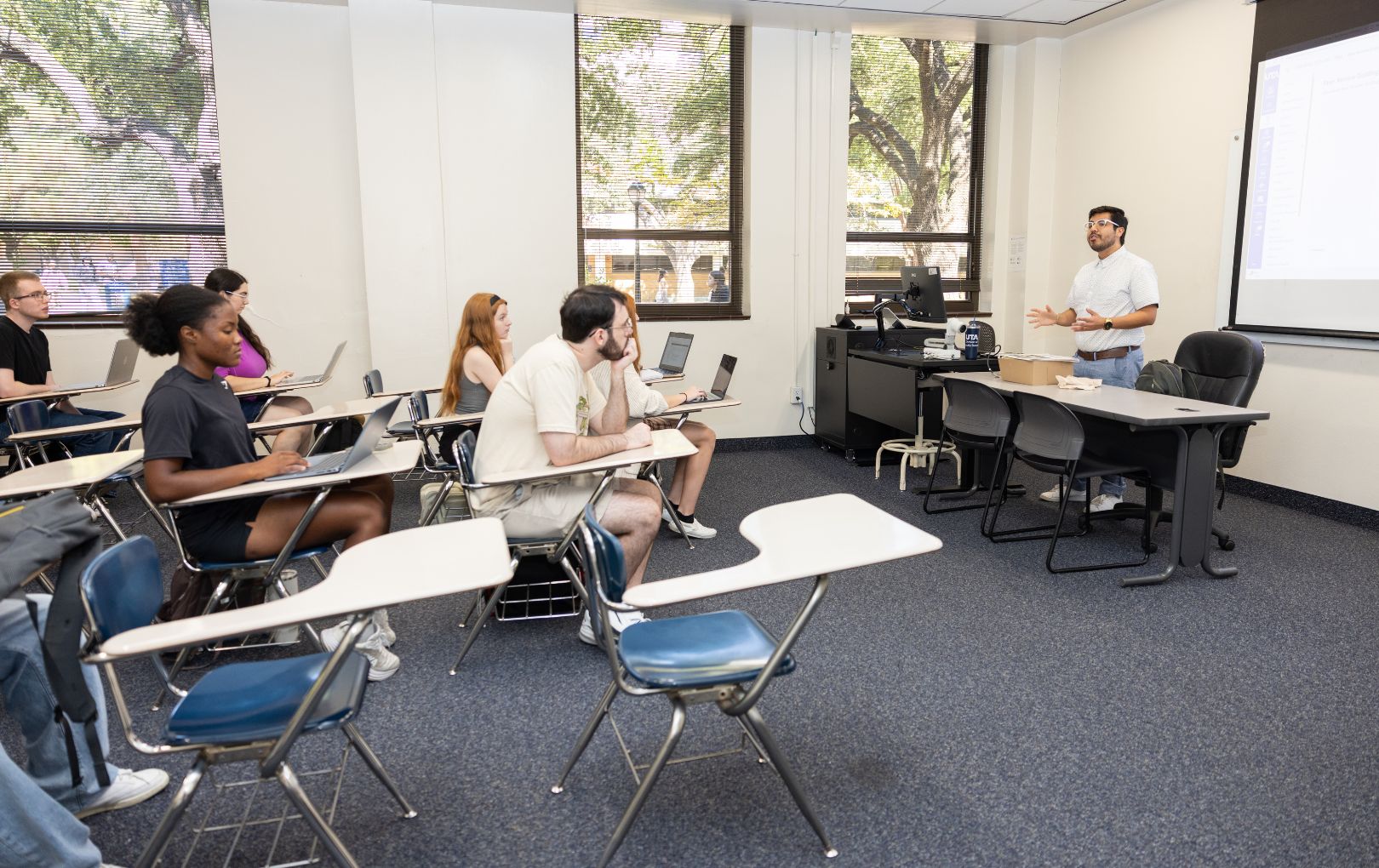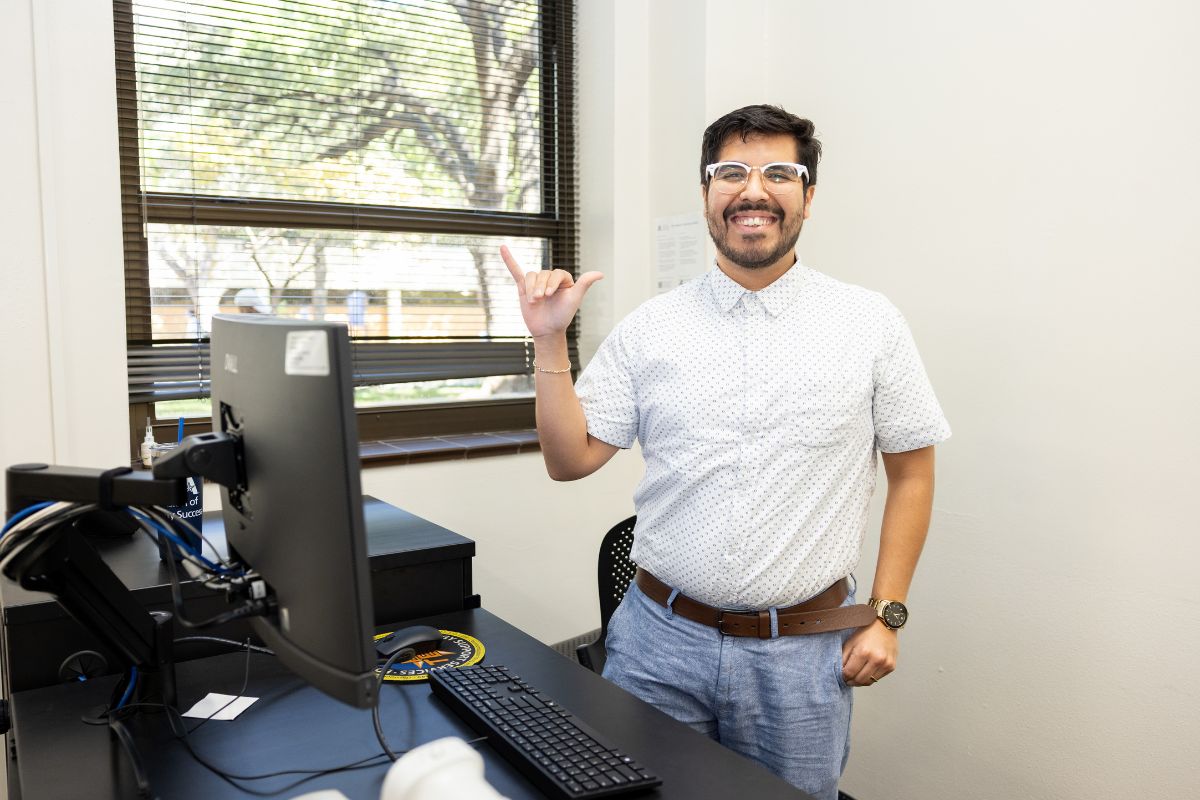Old tricks, new tech: scams in the age of AI
Thursday, Oct 09, 2025 • Cristal Gonzalez : Contact

As a college student, Gabriel Aguilar fell victim to an elaborate scam. The fraudsters posed as employers offering job opportunities that provided quick income.
He completed what seemed like a legitimate interview process, was offered a position and was even sent a check to purchase a laptop—which included a note from the perpetrators to send them the change. The scam was to unfold with the check bouncing and Dr. Aguilar being out his own money. Thankfully, his bank flagged the check because of typos and errors.
Aguilar, now an assistant professor of technical writing and professional communication in The University of Texas at Arlington’s Department of English, examines how today’s scammers are employing artificial intelligence (AI) to help con the public—in particular, the Latino population, which is often targeted.
Years ago when Aguilar was scammed, the world had not yet seen the explosive increase in AI use. If fraudsters had tried the same scam with AI today, would it have been more likely to succeed and Aguilar be successfully scammed out of money?

Aguilar’s new research aims to decrease the likelihood of vulnerable populations falling victim to AI scams by increasing his students’ AI literacy through technical writing skills.
Technical writing courses teach students how to present complex or specialized information in a way that’s clear, precise and easy for the intended audience to understand. It helps people grasp a subject, follow instructions or make informed decisions.
Aguilar’s study, recently published in the Journal of Business and Technical Communication, explores how AI scammers target susceptible populations by using age-old exploitation tactics enhanced by the rapid technological advances of this new era. His research notes deepfake, voice-cloning and AI voice bots as some of the most commonly used AI tactics to modernize some of the oldest tricks in the scammer’s playbook.
“In my field, there’s a growing consensus that when humans and AI work together, they enter into what we call creative partnerships—usually to produce work with positive and good intentions,” Aguilar said. “I pick up on the conversation and look at how these creative partnerships are happening with people who nefariously use AI in order to scam others.”
And so, for students to gain a comprehensive grasp of potential AI scams, Aguilar outlined a four-part framework for technical and professional communication instructors to use when teaching about AI.
“Essentially, this framework is to teach that AI didn’t revolutionize scamming—it gave scammers more tools to make their scam tactics more convincing,” Aguilar said. “And after students learn to detect when something is off, they can disseminate the information back to their families and communities to incrementally raise AI literacy.”
Courses like technical writing, Aguilar said, are valuable to prepare students for life beyond graduation, to teach skills that are transferable to meaningful career opportunities and to help them think critically about those opportunities.
“For me, technical writing is a tool to help dissolve blinders people may put up and get them to think and quickly see when things seem too good to be true,” Aguilar said.
About The University of Texas at Arlington (UTA)
Celebrating its 130th anniversary in 2025, The University of Texas at Arlington is a growing public research university in the heart of the thriving Dallas-Fort Worth metroplex. With a student body of over 42,700, UTA is the second-largest institution in the University of Texas System, offering more than 180 undergraduate and graduate degree programs. Recognized as a Carnegie R-1 university, UTA stands among the nation’s top 5% of institutions for research activity. UTA and its 280,000 alumni generate an annual economic impact of $28.8 billion for the state. The University has received the Innovation and Economic Prosperity designation from the Association of Public and Land Grant Universities and has earned recognition for its focus on student access and success, considered key drivers to economic growth and social progress for North Texas and beyond.
Latest News
- Bucket list wishes make final days meaningfulUTA study finds fulfilling end-of-life bucket list wishes boost well-being, family bonds, and closure
- UTA earns elite status for cybersecurity researchNSA designation affirms the University’s national leadership in cyber innovation, education and workforce growth
- From the front lines to the archives at UTALegendary journalist Bob Schieffer donates his Vietnam collection, capturing the lives and voices of Texas soldiers
- UTA honored with 2025 Star Award for student successMavs RISE program recognized for boosting retention, academic performance, and career readiness
- Saving cells from the brink of death—why it mattersUTA discovery could help scientists better understand brain development and disease
- Arthritis pain rising: How state policies matterUTA researchers tracked 10 years of data on how welfare programs and education influence joint pain






